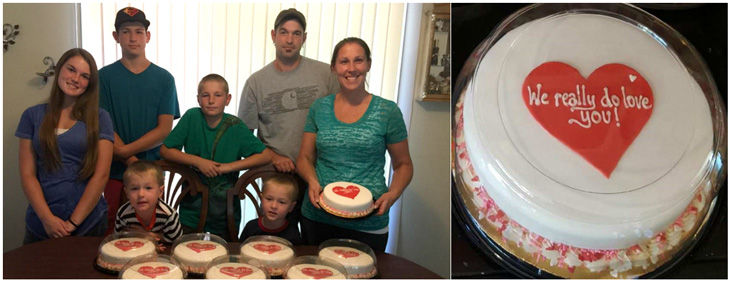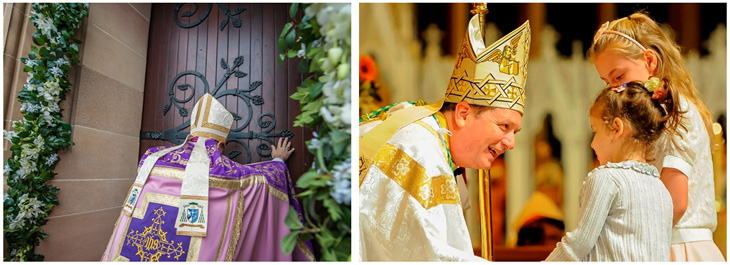Homily for the Holy Family of Jesus, Mary and Joseph + Jubilee of Families

Introduction for the Holy Family of Jesus, Mary and Joseph + Jubilee of Families
St Mary’s Cathedral, Sydney, 27 December 2015
Welcome to St Mary’s Cathedral for our Solemn Mass this morning. We are in the Octave of Christmas, that special time where Australia shuts down and families gather and we have an opportunity to fall silent before the mystery of the Babe of Bethlehem.
Today, we celebrate a Jubilee of Families within the context of the Jubilee of Mercy, which began in Sydney and throughout the world two weeks ago. Welcome to all families who have joined us this morning! I invite all family members, parishioners and visitors to pass through the Holy Door of Mercy and receive a plenary indulgence by making the Profession of Faith, praying for the Holy Father’s intentions and receiving Holy Communion at this Mass, as well as making a good sacramental Confession in a reasonable time if you have not already done so recently.
Homily for the Holy Family of Jesus, Mary and Joseph + Jubilee of Families
St Mary’s Cathedral, Sydney, 27 December 2015

In early 2013 lesbian couple Rachel Cryer and Laurel Bowman asked the Sweet Cakes bakery in Oregon bake a same-sex wedding cake for them. Bakery owners Melissa and Aaron Klein believed that baking a distinctively same-sex wedding cake would be facilitating something that violated their Christian belief that marriage is the union of a man and a woman. Cryer and Bowman filed a complaint that they had suffered discrimination based on sexual orientation and the government agency upheld that complaint. Meanwhile the baker couple faced vilification, boycotts of their business, violent protests and even death threats, and were forced to close their shop and work from home. They were then fined $135,000 and encouraged by the Tribunal to receive behaviour modification therapy so they could be rehabilitated.[1]
We can all sympathize with the desire of some same-sex couples who feel they have been excluded till now from experiencing a great good – marriage – that is open to others. We can also sympathize with the desire of others to have the unique ‘one-flesh union’ of people of opposite sex which founds family life respected as marriage. But the Oregon tribunal ruled that there’s a zero-sum game in such matters: instead of attempting to balance the competing interests, LGBTI rights must trump people’s conscientious beliefs every time; indeed dissenters must be punished and retrained. One could imagine the baker couple reacting with anger at this attack on their rights of conscience, but they did not. Imitating the mercy of the Lord Jesus and the call of our epistle this morning (1Jn 3:1-2, 21-24), they reached out to offer forgiveness and love to their persecutors. Spending several days with their five kids baking cakes, they sent them to a number of LGBTI activist groups with the message, “We really do love you!” Aaron explained that they did not want to hurt anyone and harboured no hard feelings at their end: even if they could not in conscience support a same sex wedding, they still loved such people.[2] This seemed to me a very generous response from people whose business had been ruined and whose safety threatened.

The Church has now begun a Jubilee Year of Mercy in which all her children are invited to receive the Father’s mercy and the Church’s maternal embrace. The Feast of the Holy Family is an opportunity especially for families to enter through the Holy Door of the cathedral and the compassionate door that is the side of Christ. There Pope Francis hopes we will “rediscover the infinite mercy of the Father who welcomes everyone and goes out personally to encounter them”.[3]

In our Gospel this morning (Lk 2:41-52) we see the adolescent Jesus already busy about His Father’s business and revealing the Father as a God rich in mercy.[4] His mission of mercy began there in Nazareth, in a human home, with a Mum keeping house and a Dad following a trade and providing for his dependents. There he obeyed His parents and through this, learned to obey the Father. This prepared Him for his path of perfect generosity and obedience even in suffering – a generosity and obedience that would become the source of salvation for us all (cf. Heb 5:8). The generosity of God and of the Holy Family instruct us too. And we first learn how to forgive, how to show mercy, how to develop largeness of heart, in our own families. Fifty years ago this month the Second Vatican Council closed with its document on the Church and the Modern World, Gaudium et Spes. It set the bar high for the family, describing it as a “domestic Church” and a “school in humanity”, the place where people should learn to be fully human and as divine of holy as it is possible for a human being to be. Fifty years ago no-one imagined that people would be lobbying to change the definition of marriage, and so the Council Fathers emphasized the different but complementary gifts that man and wife, mother and father, bring to marriage and family life. Though that unique union which expresses both life and love in one embrace, it is possible not just to bring together two distinct family trees but to unite them as one in the children that may follow from their marital acts. In the process Church and society are given a new generation and that new generation is given the best of starts.[5]
Some have said that the Second Vatican Council took place in overly-optimistic times and so its hopes for marriage and family were somewhat romanticized. Certainly we know that no family is perfect. Even the Holy Family, we hear today, suffered the agony of their boy going missing and the tensions inevitable as young adults begin to take their own course. Every family member must learn, therefore, how to be merciful towards each other, how to practise mercy like the Father (Lk 6:36). Like the Kleins, we should not be afraid to offer love and forgiveness to those inside and outside our families. As our community accepts thousands of refugees from conflict-riddled Syria and Iraq, we prepare to offer them hospitality, support and welcome.
In the Bull of Indiction for this Jubilee Year of Mercy, Pope Francis calls us to recommit to the practice of the spiritual and corporal works of mercy.[6] Where better to start than within the family? It is in families that we welcome and celebrate life. Parents feed the hungry, water the thirsty, clothe the naked, shelter the dependent and children, in due course, care for their elderly parents and bury them. There is no better place than the family to learn the range of ways to enact mercy, ways we must then take beyond the confines of the family.
One of the most important ‘spiritual works of mercy, the Vatican Council reminded us, is that of parents educating their children in the faith.[7] The thought is that it is a genuine act of kindness to address ignorance and share our Faith with others. Parents also gently guide and correct, without which we will not learn how to live in our community, let alone walk in the paths of salvation. Family members tend each other in grief, forgive each other in hurt, forbear each other in patience, pray for each other even when one has died. So the practice of mercy begins in the home. Having learnt it there we can take it out to our schools, workplaces and wider community, right to those on the peripheries, most in need of mercy. May today launch our families on the path of mercy!
4. St John Paul II, Dives in Misericordiae, 1.
5.Gaudium et Spes, §§48 and 52.
6. Cf Pope Francis, Misericordiae Vultus, 15.
7. Vatican Council II, Gaudium et Spes, §48.

